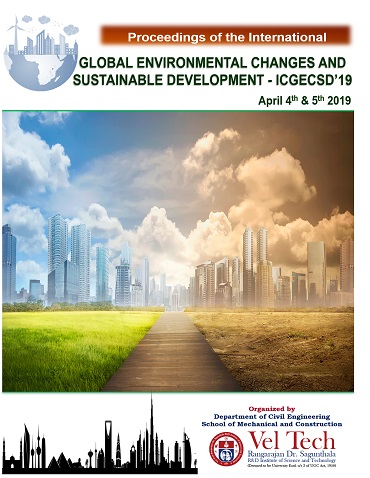- Publication Meta:Value
- Short Title:ICGECSD 2019
- Publisher:ASDF, India
- ISBN 13:978-93-88122-07-8
- ISBN 10:93-88122-07-0
- Language:English
- Type:Hard Bound - Printed Book
- Copyrights:ICGECSD Organizers/[email protected]
- Editor-in-Chief:Dr E B Perumal Pillai
- Conference Dates:04 - 05, April 2019
- Venue Country:Veltech R&D Institute of Science and Technology, Chennai, India
- Submitted Papers:250
- Acceptance Rate:8.51%
- Website:www.veltech.edu.in/icgecsd
Welcome to ASDF Electronic Digital Library!
ICGESCD 2019
ICGECSD 2019
Global Environmental Changes and Sustainable Development 2019
Paper 056
Bioremediation and Bioelectricity Genration: Microbial Fuell Cell
D Sivakumar1
1Professor, Department of Civil Engineering,
Vel Tech High Tech Dr.Rangarajan Dr.Sakunthala Engineering College, Chennai, India.
Abstract
To meet the requirement of a growing population, the energy demand are continuously increasing in the world, alternative sources are needed. Microbial Fuel Cell (MFC) is a sustainable technology that converts organic matter in wastewater into electricity, thus it can be a potential alternative source for water and energy. Microbial biofuel cells convert energy obtained from biochemical reactions into electrical energy in presence of different types of biological catalysts (living microorganisms, organelles or enzymes). One of the major differences between each type of fuel cell is the type of biocatalyst used at the anode of the fuel cell. Microbial fuel cells (MFCs) utilize whole living microorganisms that act as micro reactors and allow multiple substrates to be oxidized deeply or completely. Although significant advances in MFC research have been accomplished in the last few years, improvement in power generation and decrease in material cost are still necessary to bring MFC into practical application. Most of the previous studies used MFC as batch reactor for reducing single compound and using simulated wastewater for the treatment and power generation. This project focused to produce electrical power generation and to reduce pollutants in a sugarcane industry wastewater using Microbial Fuel Cell (MFC).
Keywords
Author's Profile
Author profile can be generated and linked through our partners World Book of Researchers. To include your profile online Click Here. After it is approved, please email to edlib @ asdf.res.in to create a link with all the papers.
e-AID
icgecsd.2019.056
Cite this Article as Follows
D Sivakumar. Bioremediation and Bioelectricity Genration: Microbial Fuell Cell. International Conference on Global Environmental Changes and Sustainable Development (2019): 56. Print.
© 2010 - by EDLIB .
All Rights Reserved.

